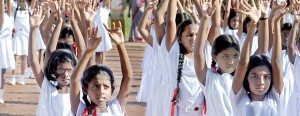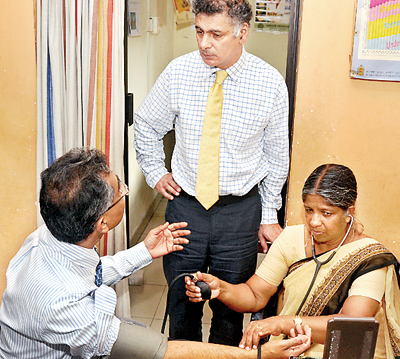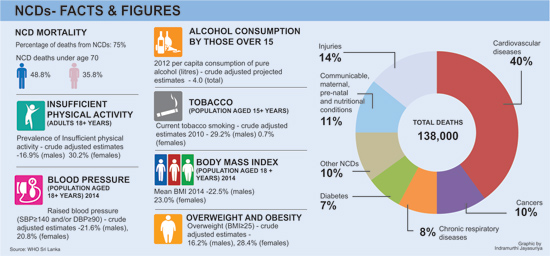News
UN Task Force urges Lanka to take bolder steps to combat NCDs
Slowly and surely this spectre is gaining a stranglehold on the world and Sri Lanka too is not spared. As its vice-like grip tightens, it leaves in its wake not only disease but also early death.

The students of Janadhipathi Balika Maha Vidayala go through the routine of exercising before some members of the Task Force. Pix by Amila Gamage
It is the spectre of non-communicable diseases (NCDs) such as cardiovascular diseases, diabetes, cancers and chronic respiratory diseases. NCDs are no respecters of people, be it men, women or children.
This is why bolder measures by Sri Lanka are being urged by a powerful United Nations Task Force to combat the NCD epidemic, The Joint Mission of the United Nations Interagency Task Force (UNIATF) on the Prevention and Control of NCDs was in Sri Lanka this week to help the country translate plans into effective action, through the coordination of all stakeholders, while ensuring that monitoring and evaluation would also be carried out to measure the successes of such actions.
The Task Force received a “staggeringly good response” from President Maithripala Sirisena, a “huge response” from Health Minister Dr. Rajitha Senaratne and all other stakeholders, a media briefing was told on Friday.

A lighter moment between Dr. Jacob Kumaresan and Dr. Nick Banatvala as to whose readings are better, while the former has his blood pressure checked at the Pannipitiya Healthy Lifestyle Clinic
Pointing out that NCDs are killing young people, those in the prime of their lives, Senior Advisor Dr. Nick Banatvala who is based at the World Health Organisation (WHO) Headquarters in Geneva said that it is also having an untold effect on families, the community, the country and also the economy.
Urbanisation and globalisation are the drivers of the NCD epidemic, he said, pointing a finger at the culprits of tobacco use, unhealthy diet, physical inactivity and harmful use of alcohol.
In Sri Lanka, the Sunday Times learns that tobacco use is at a high level with 1/3rd of men using tobacco.
With regard to the unhealthy diets that Sri Lankans are eating, Dr. Banatvala pointed out that people are consuming too much salt (two to three times more than the recommended level), too much fat and too much sugar.
His urgent plea was that the battle against NCDs cannot be a lone one fought by the Government. Everyone needs to play their part including the private sector, the media and the people.
Quoting the great strides made with regard to maternal and child health, Dr. Banatvala urged that Sri Lanka could lead the way, show the world, how the war against NCDs could be fought.
Explaining that NCDs are a burden on the growth of Sri Lanka, World Bank Senior Health Specialist Dr. Kumari Vinodhani Navaratne said a lot of resources would be needed to meet the burden of NCDs.
There is a role for all of us to play to make maximum use of the resources already available as well.
| NCD progress monitor 2015The test of Sri Lanka’s achievements or non-achievements comes in the form of an NCD Progress Monitor 2015 with 10 indicators.n Fully achieved: National NCD targets and indicators; National integrated NCD policy/strategy/action plan; Tobacco demand-reduction measures – health warnings; Harmful use of alcohol reduction measures – pricing policies; Unhealthy diet reduction measures – marketing of breast-milk substitute restrictions; and public awareness on diet and/or physical activity. n Partially achieved: Mortality data; Risk factor surveys; Tobacco demand-reduction measures – taxation, smoke-free policies and advertising bans; Harmful use of alcohol reduction measures – availability regulations and advertising and promotion bans; and Guidelines for the management of major NCDs. n Not achieved: Unhealthy diet reduction measures – salt, sodium policies, saturated fatty acids and trans-fat policies and marketing to children restrictions; and Drug therapy/counselling for high risk persons. |
She said that the World Bank has provided a soft loan of US$ 200 million to upgrade the standards of performance of the public health system to enable it to respond well to the challenges of NCDs as well as malnutrition.
Underscoring that “it was no easy task” getting 11 agencies together, WHO Representative in Sri Lanka, Dr. Jacob Kumaresan said that its goal was to enhance UN support to the Sri Lankan Government to scale up the multi-sectoral response to NCDs.
Sri Lanka was the second country (India the other) in the WHO South-East Asia Region and the eighth in the world to host the Joint Mission of the Task Force which was led by the WHO.
The other representatives were from the International Organisation of Migration (IOM); the International Labour Organisation (ILO); the Joint United Nations Programme on HIV/AIDS (UNAIDS); the United Nations Development Programme (UNDP); the United Nations Population Fund (UNFPA); the United Nations Educational, Scientific and Cultural Organization (UNESCO); the United Nations Children’s Fund (UNICEF); the UN Volunteers (UNV); the World Food Programme (WFP); and the World Bank.
| Prioritise action, harness all stakeholders and evaluate impactPrioritise a set of cost-effective actions for implementation in the war against NCDs, harness and coordinate the efforts of all stakeholders and monitor and evaluate the impact of implementation.These are the recommendations of the UNIATF to the Government of Sri Lanka, according to the WHO Representative to Sri Lanka, Dr. Jacob Kumaresan. Dr. Kumaresan told the Sunday Times that there was high-level commitment from the highest levels of government to address the mortality (deaths) due to NCDs, while strong enthusiasm and willingness were exhibited by civil society, academia and the private sector to mount a solid response for the prevention and control of NCDs. There is a plan to prioritise a set of key cost-effective interventions to maximise health gains. Asked what challenges Sri Lanka faced in NCD prevention and control, he said that they included bringing together multiple stakeholders to mount a coordinated response to NCDs and monitoring and evaluating the impact of the many interventions being implemented. On the part of the UN, it will “fully support government efforts on the multi-sectoral plan for NCDs and provide a concerted UN approach”, Dr. Kumaresan added. Dr. Nick Banatvala, meanwhile, added that to ensure that the UN Agencies in Sri Lanka scale up their support for the national NCD response in a coordinated manner, the Task Force is recommending that they establish a UN Thematic Group on NCDs under the leadership of the WHO. Having discussed the draft National Multisectoral Action Plan for Prevention and Control of NCDs 2016-2020, which sets out a blueprint for all stakeholders of Government to work together with development partners to combat the NCD epidemic, he said that the key now is to prioritise action, coordinate an effective response and ensure accountability. He cited some of the actions which should be prioritised such as further raising the tax on tobacco, banning all forms of tobacco advertising, replacing trans-fats with polyunsaturated fats and restricting or banning alcohol advertising. |
| Healthy lifestyles: Schools show the wayThe heavy rains had cleared and it is on the sunny morning of Thursday that some members of the UN Task Force see the programme initiated by Janadhipathi Balika Maha Vidyalaya in Nawala to keep its schoolgirls healthy.A few hundred girls, smartly clad in their white uniforms with red ribbons keeping their hair in place, are exercising vigorously to music in a bid to keep obesity at bay. Although challenged by the lack of space in the grounds for all 3,000-odd schoolgirls to exercise together, they have devised a scheme for groups to engage in exercise on alternative days. A little while later the Task Force is given an insight into the healthy lifestyle programmes undertaken by Royal College, Colombo, with its 8,500 students. While they had organised a walk to provide safe drinking water to children in the North Central Province facing the threat of chronic kidney disease of unknown aetiology, the programme now encompasses spreading the message of good health practices and saying “no” to tobacco and alcohol in the college as well as taking the message to 150 schools in the Western Province. As Royal College Principal Upali Gunasekera points out that a fast food outlet just a stone’s throw from the school had cut rates of its food on Children’s Day, none of the boys fell for this temptation as they are armed with knowledge on healthy food. Two more stops for some of the Task Force members that day were the Healthy Lifestyle Clinic (HLC) at Pannipitiya where people are screened for NCDs, referred to a hospital if they have any of the diseases or advised on prevention if they don’t and a location in Malabe where the Millennium Walking Club meets for exercise and winds up after gulping down steaming glasses of kola kenda for breakfast. It is food that brings about light banter when on Tuesday, the Task Force meets representatives of the Food Processing Industry at the Export Development Board in Colombo 2. As the discussion centres around ideas put forward that Sri Lankans have a sweet-tooth and how hard it is to sell food with less sugar and also salt, laughter erupts as pieces of coffee cake with not one but two layers of icing are served along with cups of milk tea laced with sugar. In contrast, the school in Nawala served halape and koli-kuttu with a drink choice of thambili or beli-mal tea and Royal College glasses of fruit juice. On offer at the Pannipitiya HLC were conical vandu-appa made of rice flour, a delicious meneri cake and plain tea with sugar given separately. The Food Processing Industry, meanwhile, talks of the contribution of the smaller food manufacturers towards the ill-health of the nation and also how difficult it is to reduce sugar as it would lead to a drop in sales and a gain for competitors. The discussion creates a terrifying image of a nation which would enjoy sugary drinks and then pop pills to control diabetes. The consensus is that it is a difficult task but one that has to be done and the way forward would be for the industry to work together slowly and steadily to protect people from NCDs including “our very own children”. The tightly-packed five days from Monday to Friday also entailed extensive discussions for the Task Force not only with high-level health policymakers and officials but also those in national planning, sports, National Youth Services Council, city planning and water supply, agriculture, education, armed forces, private health sector, Chamber of Commerce, non-governmental organisations, civil society, academia, professional colleges and the Sri Lanka Medical Association’s Nirogi Lanka Project. |

